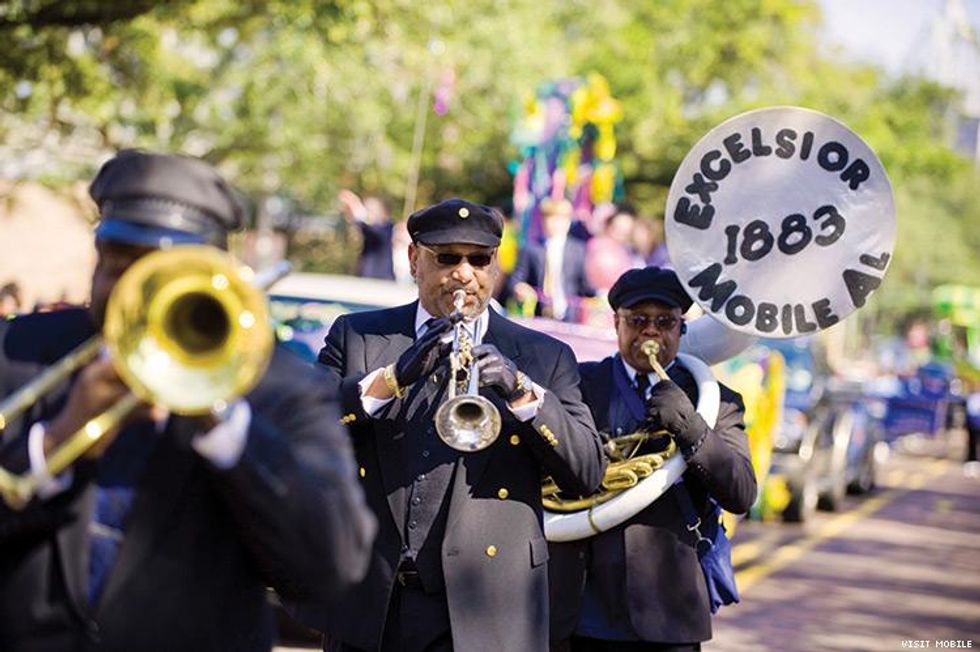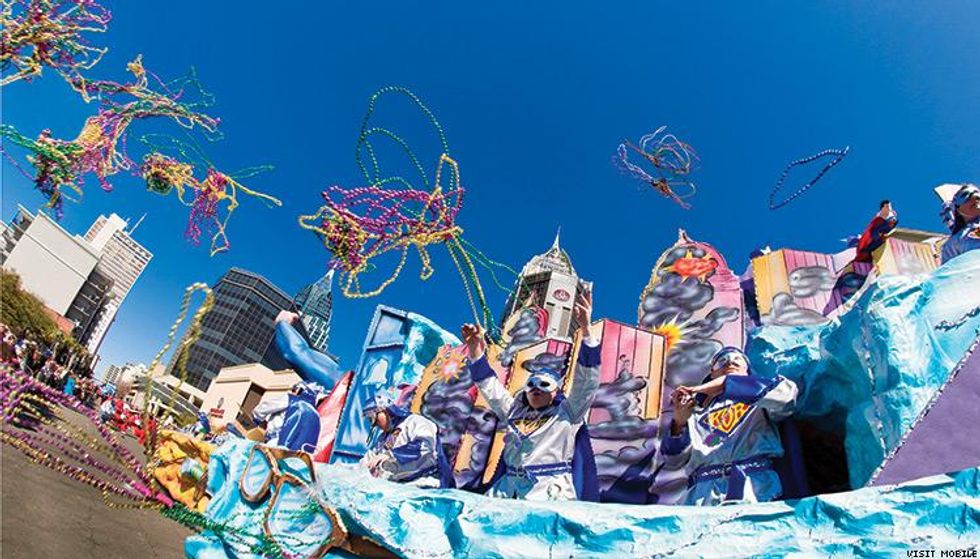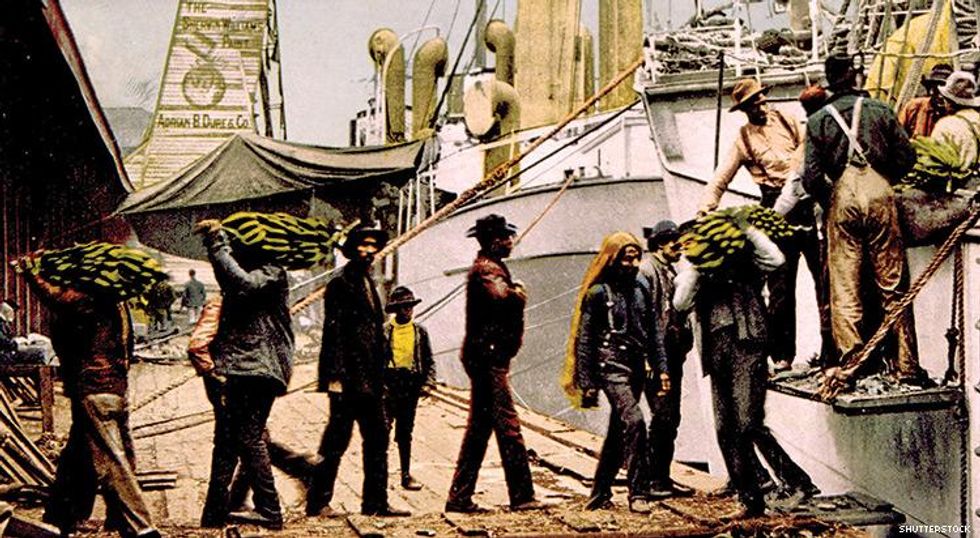Exclusives
The Alabama City That Doesn't Run From Its Cruel Past

These five Mobile spots recognize the state's Black history and celebrate its future.
October 26 2019 5:28 AM EST
By continuing to use our site, you agree to our Privacy Policy and Terms of Use.

These five Mobile spots recognize the state's Black history and celebrate its future.
"It's complicated." Just about anyone who's ever been in a relationship has uttered that phrase at least once, but it's even more fitting when it comes to American history.
The city of Mobile, Ala., founded in 1702, has existed under six sovereign flags in half as many centuries, constantly evolving as it flip-flopped between French, British, Spanish, Confederate, American, and, briefly, Republic of Alabama rule. Through all of its changes, a culture infused by a strong African-American presence has remained possibly the single constant in Mobile history, and it's finally attracting the attention it deserves with the city's current renaissance. There's an active LGBTQ community, with three gay bars downtown (B-Bob's, Gabriel's, and Flip Side) and further out there's Midtown Pub. But this Alabama town (an hour from the perennial queer hotspot of Pensacola, Fla.) has LGBTQ visitors coming for the food, music, history, and traditions heavily influenced by African-Americans.
Dine at Southern National
A restaurant steeped in local history, Southern National serves modern takes on classic Southern cuisine in a casual setting of Alabama pine and exposed brick within the 110-year-old Wilkins-Higgins building, renovated during Mobile's Arts District revival in 2006. Restaurateur Reggie Wilson's 90-year family heritage in the area drew him to the revitalized Mobile downtown where chef Duane Nutter serves everything from grilled shrimp jalapeno Johnny cakes to thyme-smoked pork belly. If you're lucky, you might also catch Nutter performing stand-up around town -- he was a Comedy Central Laugh Riots semi-finalist.

Successful banker turned jazz club owner Marc Jackson brought his life savings back to his hometown in order to open Kazoola, an entertainment venue and eatery named for one of Mobile's most famous former citizens. Cudjoe "Kazoola" Lewis was one of the last enslaved Africans ever brought to the United States aboard the notorious Clotilde, the last known slave ship from Africa to the U.S, and ultimately became the last surviving citizen of Africatown, where several survivors of the Clotilde settled and created their own community within Mobile. Jackson opened Kazoola with the aim of bringing the community closer together through musical unity and he draws on the venue's namesake to educate and inspire. Local music, affordable food, and strong community have made Kazoola a top destination not just within Mobile, but across Alabama and beyond.

Anyone from Alabama will remind you that Mardi Gras wasn't started in New Orleans, but in Mobile. While NOLA is undoubtedly the epicenter of all things Mardi Gras to the country at large, it's still a major industry in Mobile, accounting for $227 million annually for the city alone (proving the impact of hotels, restaurants, and retail throughout the city). And the history of the holiday and all its glitzy glory is a perennial hot topic about town. In fact, Carnival, which is Mardi Gras and all of the celebrations leading up to it, has its own museum where visitors find a rich heritage of African-American prestige among the festivities. The Mobile Area Mardi Gras Association began as the Colored Carnival Association in 1938 and is one of the two most revered societies in all of Mobile Mardi Gras. Each year, its royal couple pumps tens of thousands of dollars into the local economy through lavish dinners, balls, and epic couture trains that are often later enshrined in museums. Sightseers can catch up on the history of MAMGA at the Carnival Museum, but these elaborate and impressive trains will be the highlight. Each tells the unique tale of the leading local citizen who wore them. Most of the individually designed, handmade trains cost as much as a small wedding. Look for the one so heavy it once required hidden rollers underneath.
Grab Lunch at Mama's
From country fried steak to shrimp and grits, Mama's is soul food heaven, and everyone in Mobile knows it. It's only open for weekday lunch, with a small menu of Southern specialties each day, and lighter fare of salads and sandwiches available throughout the week. Get in line early and grab a table at Mama's, but save room for what locals and visitors alike consider the best banana pudding for miles. Owners Marshall and Katy Barstow named it Mama's to evoke the home cooking you'd expect from your Southern mama's kitchen. Everyone seems to agree they've succeeded!

For an all-encompassing overview of African-American history and heritage in Mobile (outside of a museum) hitch a ride with a Dora Franklin Finley African-American Heritage Trail tour guide. Though there's tremendous education and immersion to be found within the History Museum of Mobile, the comprehensive trail with more than 40 points of African-American significance on the tour ranges from early churches and houses of important figures to enslaved people and Africatown. Become better acquainted with the lives of those who brought Mobile through its history to present, guided by a storied local family with intimate ties to the development of the city and the nation.
Charlie Kirk DID say stoning gay people was the 'perfect law' — and these other heinous quotes